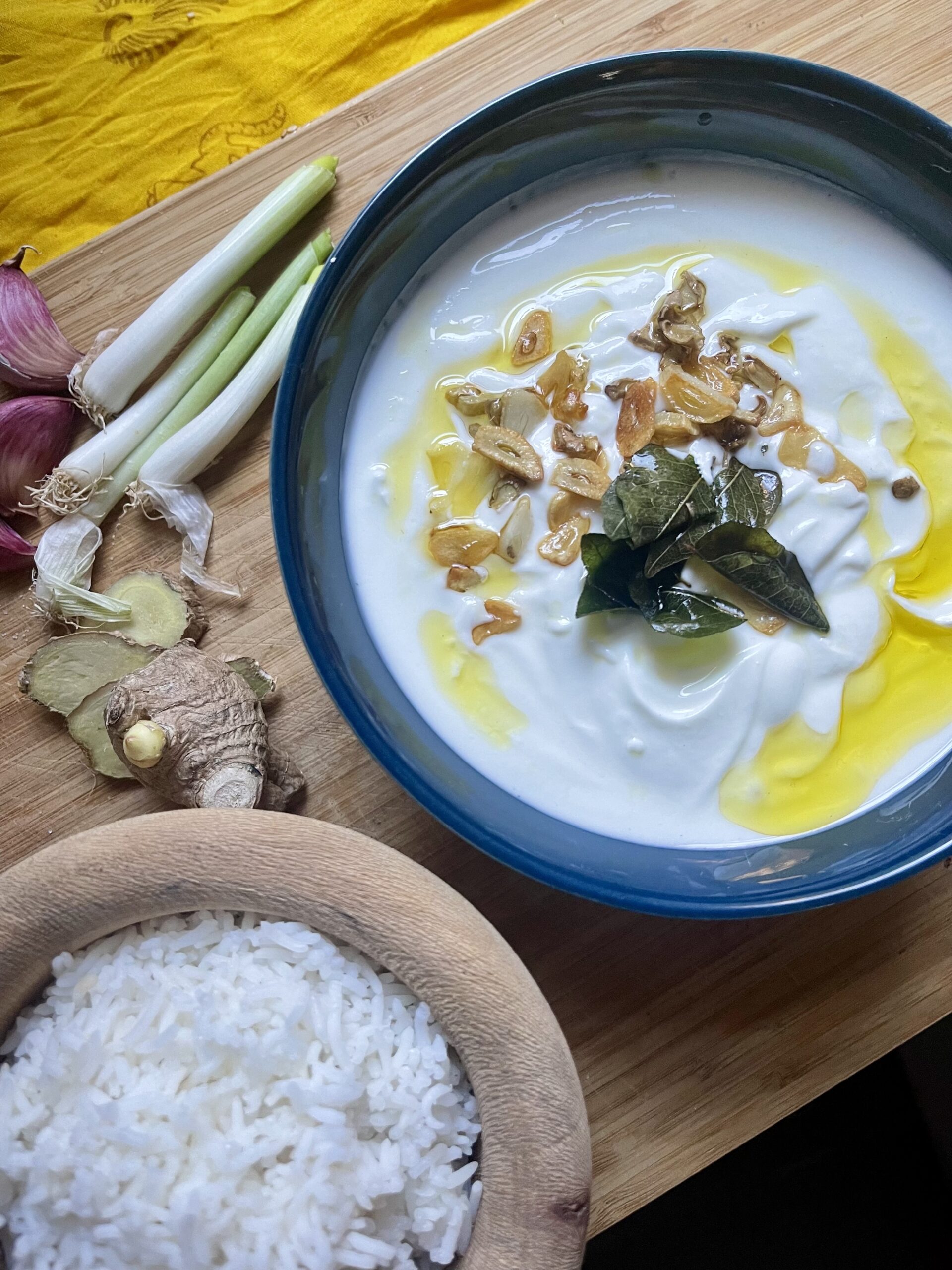POV: You’re craving South Asian flavors. It’s a weekday night. You have some lentils cooking and rice steaming away. You don’t have the energy to make another side dish but want a little something to compliment the basic rice and lentils combo. This is the side dish that you’re looking for.
Why you’ll love this recipe
Minimal ingredients pack max flavor. Three ingredients do the heavy lifting on this simple dish.
It’s a solid and easy compliment to all dhaals (lentil dishes).
Yogurt naturally balances the spice of chili, especially for those who are not used to or easing into eating South Asian spiced food.
Tips and Lessons
The non-negotiable ingredient here is the fresh curry leaves. You can’t substitute them without losing the characteristic flavor.
Use full-fat yogurt. The fat in the yogurt is essential for making this dish tasty. If you are health conscious and want to minimize fat intake, consider switching to the plant based version of this recipe (see below).
Watch the garlic! In this dish, garlic is sautéed in oil. I’ve often prepared this dish mindlessly and discovers the garlic had burnt. Discard the burnt garlic and oil and start over. Burnt garlic will taste bitter and seep through the whole curry.
Flavorful Origins
My mom learned this recipe from a Malyali home cook originally from Thiruvananthapuram, the capital of the South Indian state of Kerala, around thirty years ago. In all of India, recipes differ strongly among different religious denominations, this recipe is of a Hindu South Indian origin.
Originally, this recipe is made with freshly curdled milk. In tropical climates, fresh curd is usually very sour and not comparable to the mild yogurt of the colder climates in the Northern Hemisphere. This recipe deliberately swaps the sour curd of the tropics for the milder yogurt available in the Northern Hemisphere.
The cousin of this curry leaf raita is the traditional yogurt with vegetables. Traditionally this fresh curd is combined with diced cucumber, tomato and chilli. This dish is sour, spicy and usually served as a condiment to Biryani and other rice based dishes in South Indian cuisine.
The Curry Leaf: The unchallenged star of South Indian cuisine
Curry leaves are the unchallenged star of South Indian cuisine, with a taste so unique that spice blends were initially made to mimic its flavor profile. Actually, the much wider known curry powders we know today are remnants of the spice blends that mimicked the bold flavor of the curry leaf. In fact even the word curry to describe an Indian dish derived from the South Indian word ‘kari,’ which was the original name and spelling of the curry leaf.
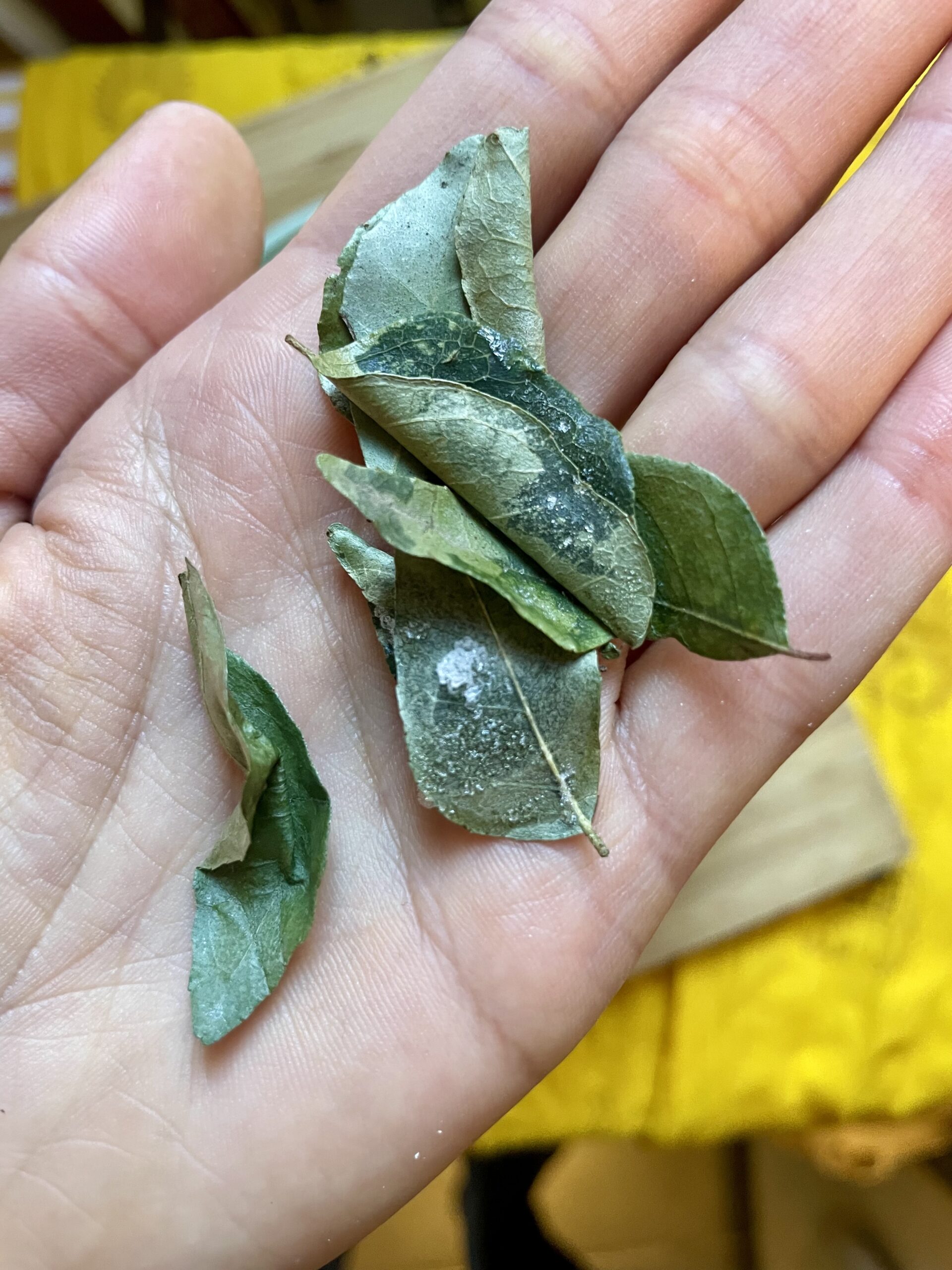
Curry Leaf: A Brief Background
Hailing from the curry tree, a citrus family relative native to South India and Sri Lanka, curry leaves, also known as kari, boast botanical fame as murraya koenigii. Despite the modest size of the curry tree (about 4 to 6 meters), its leaves are potent, rich in antioxidants, and integral to Ayurveda, where they’ve been used for centuries to address various health issues. Curry leaves have been associated with a number of health benefits including reducing inflammation.
How to Use Curry Leaves
Curry leaves enhance the taste of stews, South Indian soups like rasam and sambar, lentil dishes, chutneys, and appetizers like samosas. The fresh leaves are widely available in the Indian Subcontinent and can be sourced at Indian specialty grocers. I highly recommend buying them fresh, they are usually kept in the fridge at the grocers, and immediately freezing them at home. Due to their strong pungent taste, you only really need two or three per dish, which means a bunch of curry leaves can go a long way. The freezer keeps them fresh almost indefinitely. If you want to cook with frozen curry leaves, I add them to hot oil immediately after taking them out of the freezer. No need to defrost the delicate leaves. This is convenient and allows you to use just as much as you need.
Cooking with Curry Leaves
Curry leaves are indispensable and commonly used in the initial stages of cooking. When using curry leaves, incorporate them at the beginning of the cooking process. Detach each leaf from its stem and fry in hot oil to release essential oils, infusing your dishes with a burst of flavor. Fried with vegetable oil and aromatics such as garlic and onions, they lend a unique flavor to South Indian dishes.
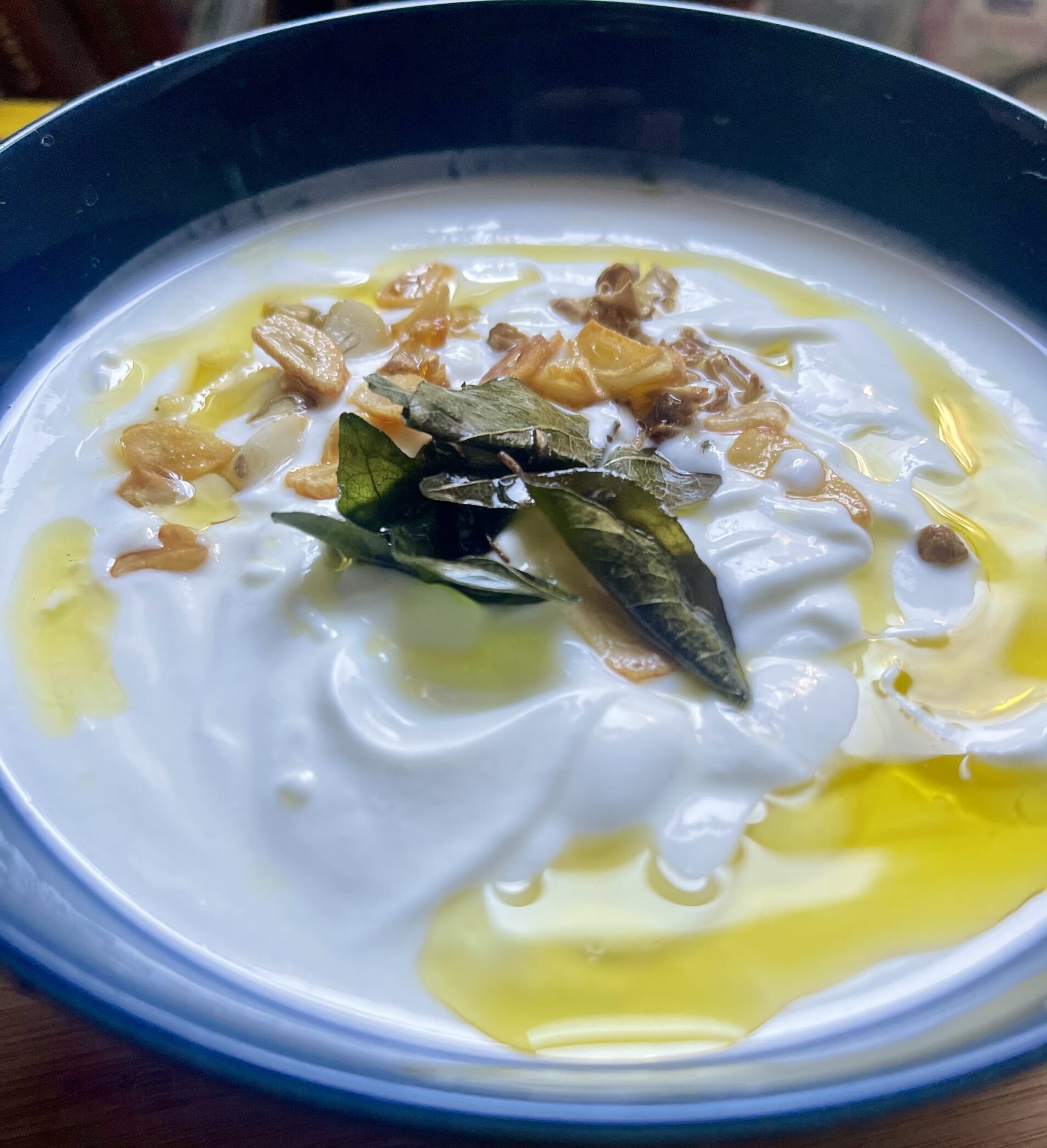
Ingredients
2-3 fresh curry leaves – Access to fresh curry leaves can be tricky. Usually, South Asian grocers carry fresh curry leaves. I freeze them right after purchase. This is perfect for portioning.
2 cloves garlic, preferably fresh
1 knob of ginger, about the size of your thumbnail (optional)
Full fat yogurt – I prefer a mild full fat yogurt. If you have Greek yogurt on hand, add a little water to make it less stiff.
Pantry Items
Good quality olive oil – I love using high quality extra virgin olive oil in this recipe. It’s far from usual for South Indian cuisine, but I love the taste of good olive oil in this dish. Substitute with peanut oil for a neutral alternative.
Salt to taste
Make it lactose-free / plant-based
To make this recipe plant-based, use coconut or almond yogurt. I would not recommend oat-based yogurt because it usually doesn’t have enough fat content to create a creamy consistency.
To make this recipe lactose-free use freshly made kefir instead of yogurt, this adds healthy probiotics to your dish and a tasty sour tang.
How to make my mom’s 3-ingredients yogurt curry
- Gently heat a generous amount of olive oil in a skillet or pan on low to medium heat.
- Meanwhile, slice or dice the garlic cloves.
- Take out 2-3 fresh curry leaves from the freezer or the fridge.
- Add the curry leaves and garlic to the warm olive oil and sauté until fragrant.
- Immediately remove the pan from the heat before the garlic burns.
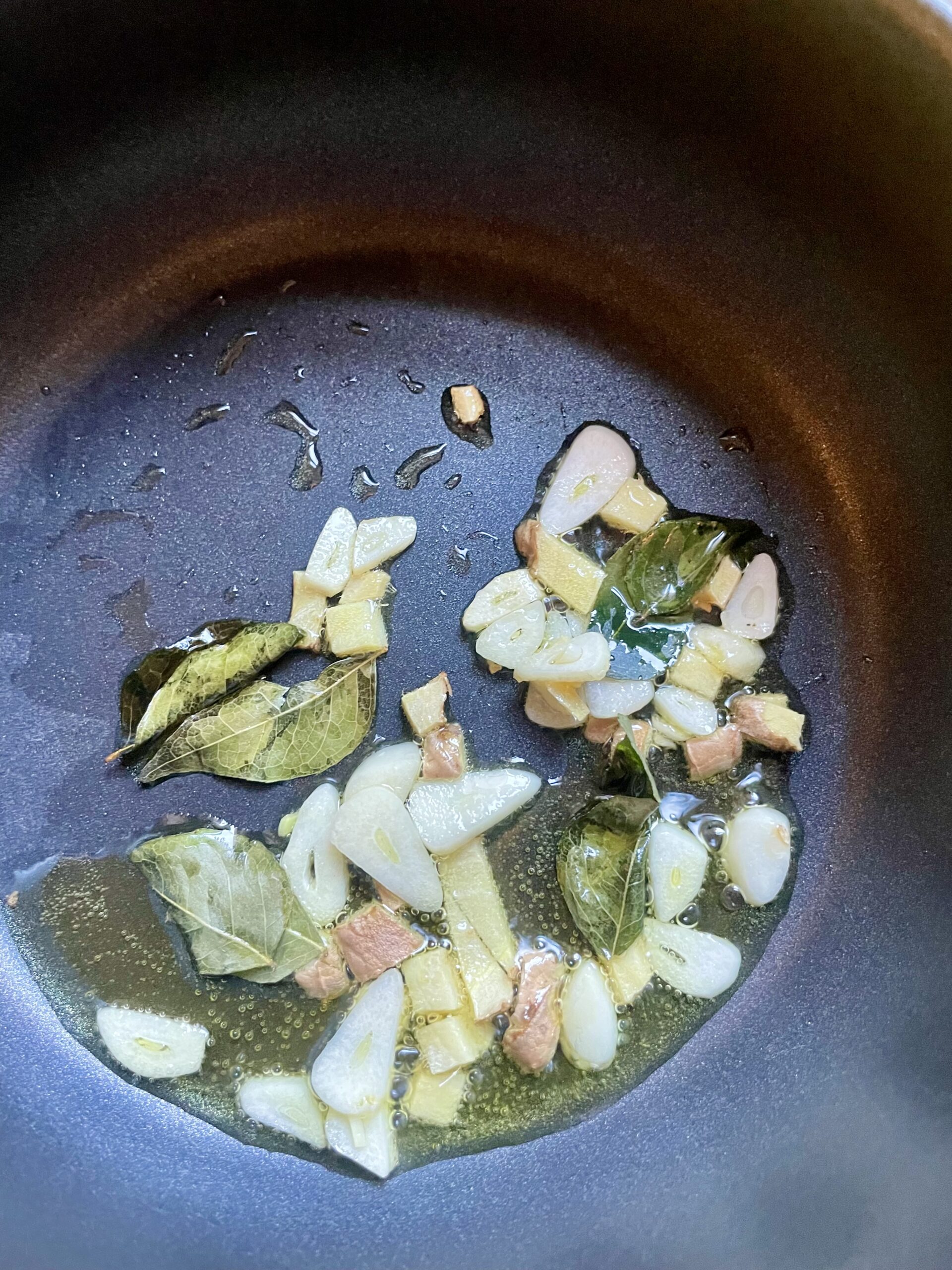
- Add the cold yogurt to the curry, it will warm a bit in the process, which is the intended result.
- Mix well and serve immediately with rice, roti, chapati, naan and or dhaal.
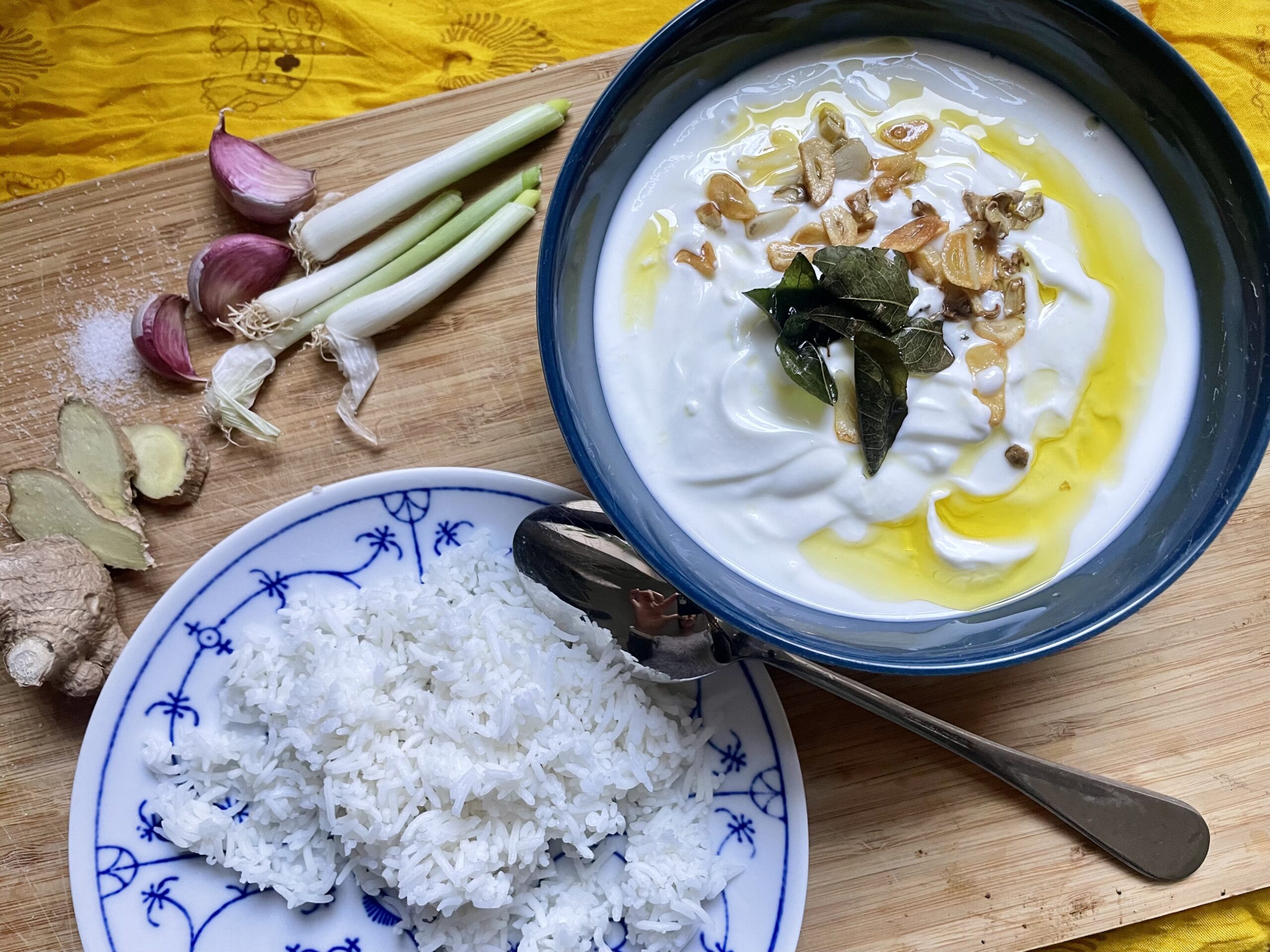
How to store
This dish stores well in the fridge, the flavors steep through. Do not store at room temperature, as the liquid and fat in the yogurt will separate. Make sure to cover the dish when storing in the fridge, otherwise the yogurt takes on fridge smells.
How to pair
This works well as a side dish or condiment – it shines, when in combination with other bold tastes. This dish is especially well suited to cut the heat of spicy curries. You can’t go wrong pairing this with dhaal (lentils) or some other curry. It’s also a great addition to this saag paneer.
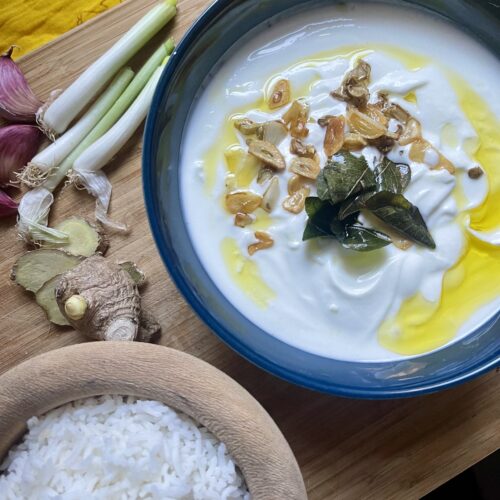
My mom’s 3-ingredients Curry Leaf Raita (yogurt)
Equipment
- 1 Skillet or non-stick frying pan A medium or small skillet will do
- 1 Bowl For serving
Ingredients
- 1 kg Full Fat Yoghurt
- 2-3 Curry leaves Access to fresh curry leaves can be tricky. Usually, South Asian grocers carry fresh curry leaves. I freeze them right after purchase. This is perfect for portioning.
- 2 cloves Garlic Preferably fresh
- 1 knob Ginger
Pantry Items
- 1 tbspn olive oil If you can use good quality here, it makes a difference to the taste.
- 1 pinch of salt
Instructions
- Gently heat a generous amount of olive oil in a skillet or pan on low to medium heat.
- Meanwhile, slice or dice the garlic cloves and ginger.
- Take out 2-3 fresh curry leaves from the freezer or the fridge.
- Add the curry leaves and garlic to the warm olive oil and sauté until fragrant.
- Immediately remove the pan from the heat before the garlic burns.
- Add the cold yoghurt to the curry, it will warm a bit in the process, which is the intended result.
- Mix well and serve immediately with rice, roti, chapati, naan and or dhaal.
